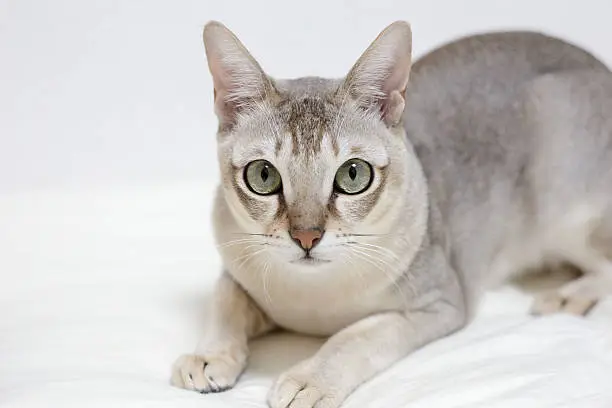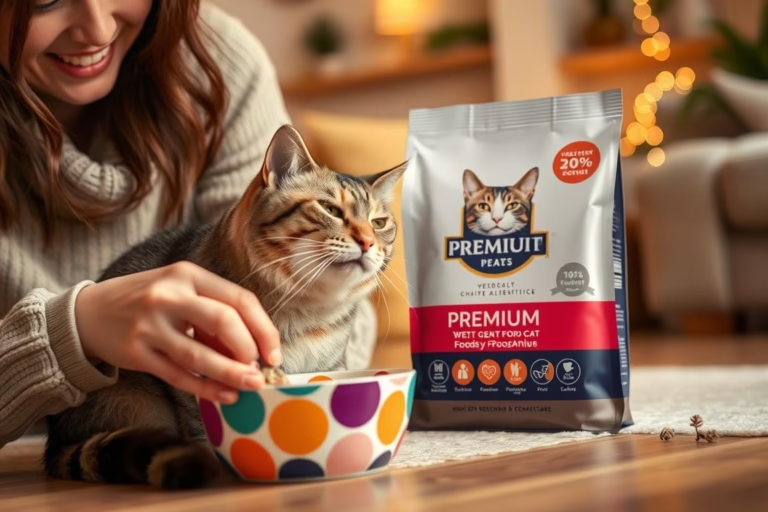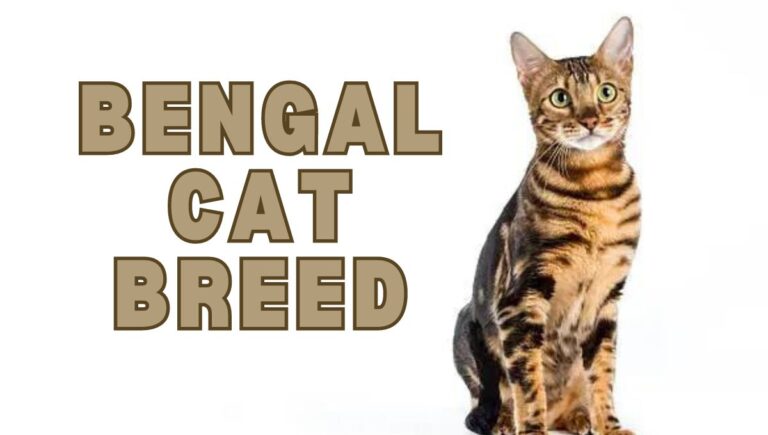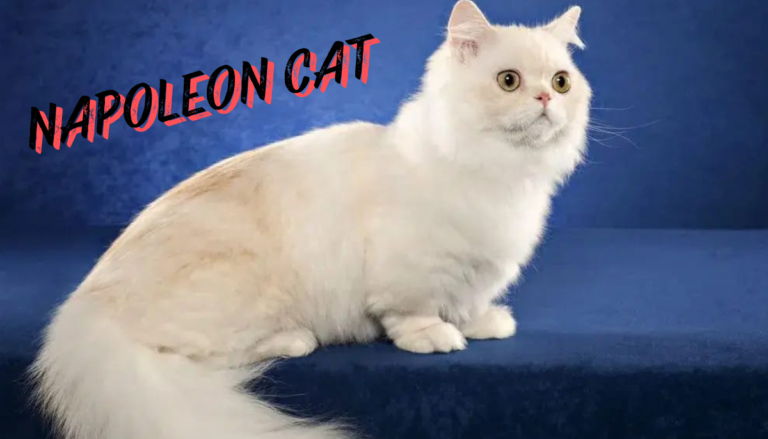Singapura Cat Breed
The Singapura cat breed is a petite and charming feline known for its distinctive appearance and endearing personality. Its name, “Singapura,” originates from the Malay word for Singapore, where the breed is believed to have originated.
These cats are renowned for their small size, making them one of the smallest domesticated cat breeds. Despite their diminutive stature, they possess a robust and muscular build, giving them a surprising agility and athleticism. Their coats are short, sleek, and typically feature a warm sepia-toned coat with ticked tabby markings, giving them an appearance akin to a tiny wildcat.

Singapura cats have large, almond-shaped eyes that radiate an expression of intelligence and curiosity. Their ears are large and slightly rounded, adding to their attentive and alert appearance. Despite their small size, Singapura cats are known for their energetic and playful nature. They enjoy interactive play and often form strong bonds with their human companions.
One of the key characteristics that make the Singapura breed unique is their affectionate and sociable personality. They thrive on human interaction and are known for their tendency to shadow their owners around the house. Despite their small size, they have big personalities and are not shy about expressing their opinions through vocalizations.
In summary, the Singapura cat breed is a captivating combination of charm, intelligence, and affection. Their petite size, distinctive appearance, and lively demeanor make them a beloved companion for cat lovers worldwide.
Table of Contents
I. Origin and History of Singapura Cat Breed :
Breed’s Origins and Historical Significance :
The Singapura cat breed’s origins can be traced back to the streets of Singapore, hence its name, which means “Singapore” in Malay. Despite its small size, this breed has a significant historical significance in the feline world.
Geographical Region of Origin :
- The breed is believed to have originated in the city-state of Singapore, located in Southeast Asia.
- Singapore’s tropical climate likely influenced the breed’s characteristics, such as its short, sleek coat and small size.
Breeds Involved in Formation :
- While the exact ancestry of the Singapura cat breed remains uncertain, it is thought to have been developed from a combination of local Singaporean cats and imported cats.
- The Abyssinian and Burmese breeds are believed to have played a role in the formation of the Singapura breed, influencing its coat color and distinctive ticked tabby markings.
Influence on Characteristics :
- The hot and humid climate of Singapore likely contributed to the Singapura’s small size and sleek coat, as these traits are advantageous in such environments.
- The breed’s ancestors, such as the Abyssinian and Burmese, have influenced its affectionate and sociable temperament, as well as its distinctive appearance.
Folklore and Legends :
- While there are no specific folklore or legends surrounding the development of the Singapura breed, its origin in Singapore adds an air of mystery and intrigue to its history.
- Some fanciers speculate that the breed may have existed in Singapore for centuries, possibly even dating back to ancient times, but concrete evidence is lacking.
In conclusion, the Singapura cat breed’s origins in Singapore, along with its mix of local and imported ancestors, have contributed to its unique characteristics and historical significance in the world of feline breeds. While its exact history may be shrouded in mystery, its charm and appeal are undeniable.
II. Physical Characteristic of Singapura Cats :
| Height | Singapura cats are small in stature, typically standing around 6 to 8 inches tall at the shoulder. |
| Weight | They are one of the smallest domesticated cat breeds, with adult females weighing between 4 to 6 pounds and males weighing between 6 to 8 pounds. |
| Life Span | Singapura cats have a relatively long life span, ranging from 12 to 15 years on average, with some individuals living even longer when provided with proper care and attention. |
| Good With | Singapura cats are known for their affectionate and sociable nature, making them excellent companions for individuals, families, and other pets. |
| Temperament | They are friendly, playful, and outgoing, often forming strong bonds with their human companions. Singapura cats are also known for their vocalizations, often expressing themselves through soft chirps and trills. |
| Intelligence | Singapura cats are intelligent and curious by nature, enjoying interactive play and mental stimulation. They can quickly learn tricks and enjoy puzzle toys that challenge their minds. |
| Shedding Amount | Singapura cats have a short, sleek coat that requires minimal grooming and tends to shed less than longer-haired breeds. However, they may still shed seasonally. |
| Grooming | Due to their short coat, Singapura cats require minimal grooming. Regular brushing helps to remove loose fur and keep their coat shiny and healthy. |
| Exercise Needs | While they are active and playful, Singapura cats do not have particularly high exercise needs. Interactive play sessions and access to toys can help fulfill their activity requirements. |
| Energy Level | Singapura cats have a moderate energy level, enjoying both playtime and relaxation in equal measure. |
| Meowing Level | Singapura cats are not excessively vocal but may meow occasionally to communicate with their owners or express their needs. |
| Drool amount | Singapura cats are not known to drool excessively. |
| Coat Length/Texture | They have a short, fine coat that lies close to the body, giving them a sleek and elegant appearance. |
| Colors | The Singapura breed typically comes in a warm sepia-toned coat with ticked tabby markings. The coat color may vary slightly, but it generally has a rich and vibrant hue. |
| Patterns | Singapura cats often exhibit ticked tabby patterns, where individual hairs have alternating bands of color. This creates a distinctive “agouti” appearance, resembling that of wild cats. |

Detailed Physical Characteristic of the Singapura Cat Breed :
Size:
- Singapura cats are small in size, with a slender and petite build.
- Adult females typically weigh between 4 to 6 pounds (1.8 to 2.7 kg).
- Adult males generally weigh between 6 to 8 pounds (2.7 to 3.6 kg).
- They stand around 6 to 8 inches tall at the shoulder.
Coat Type:
- Singapura cats have a short, fine coat that lies close to the body.
- The coat is smooth and sleek, with a soft texture.
Color Variations:
- The coat color of Singapura cats is typically warm sepia-toned.
- Common color variations include shades of beige, brown, and chestnut.
- The coat may have ticked tabby markings, where individual hairs have alternating bands of color, giving it a distinctive agouti appearance.
Coat Texture and Length:
- The coat texture of Singapura cats is soft and silky.
- It is short in length, with minimal grooming requirements.
Distinctive Features:
- Singapura cats have large, almond-shaped eyes that radiate intelligence and curiosity.
- Their ears are large and slightly rounded, adding to their alert and attentive appearance.
- The tail of a Singapura cat is slender and tapers to a fine point, complementing their elegant physique.
- One of the most distinctive features of the Singapura breed is its small size, making it one of the smallest domesticated cat breeds.
These unique physical traits, including their small size, sleek coat, ticked tabby markings, and distinctive ear and tail characteristics, set the Singapura breed apart from others, giving them a charming and captivating appearance.
III. Temperament and Personality of Singapura Cats :
Typical Temperament:
- Singapura cats are known for their affectionate and sociable nature.
- They are friendly, outgoing, and enjoy interacting with their human companions.
- Singapuras are often described as being “people-oriented” and thrive on attention and affection.
- They are also curious and intelligent, enjoying exploring their environment and engaging in interactive play.
General Demeanor:
- Singapura cats typically have a gentle and sweet demeanor.
- They are not overly demanding but enjoy spending time with their owners.
- Singapuras may follow their owners around the house, wanting to be involved in daily activities.
Friendliness and Sociability:
- Singapura cats are generally friendly towards people and other pets.
- They often get along well with children and are patient and tolerant of handling.
- They may form strong bonds with specific family members but are usually welcoming to visitors.
Common Behavioral Traits:
- Affectionate: Singapura cats are known for their cuddly nature and enjoy being close to their owners.
- Playful: They have a playful and energetic side, enjoying interactive toys and games.
- Vocal: Singapuras are not excessively vocal but may communicate through soft chirps and trills to express their needs or desires.
- Curious: They have a natural curiosity and may investigate new objects or areas in their environment.
- Intelligent: Singapura cats are smart and quick learners, often enjoying puzzle toys or learning tricks.
Challenges:
- While Singapura cats are generally well-behaved, they may become bored or anxious if left alone for long periods.
- Some Singapuras may have a strong prey drive and may be prone to chasing small animals or objects.
- Due to their affectionate nature, Singapuras may become clingy or suffer from separation anxiety if they feel neglected.
Managing Breed-Specific Behavior Issues:
- Provide plenty of interactive toys and games to keep your Singapura mentally and physically stimulated.
- Spend quality time with your cat each day, engaging in play and affectionate interactions.
- Consider adopting another cat or providing environmental enrichment if your Singapura is prone to boredom or loneliness.
- Practice positive reinforcement training to encourage desired behaviors and discourage unwanted ones.
- Ensure your Singapura has a safe and secure environment to explore, with plenty of vertical space for climbing and perching.
Overall, by understanding and meeting the specific needs of the Singapura breed, you can foster a happy and fulfilling relationship with your cat while managing any potential behavior issues that may arise.

IV. Care and Maintenance of Singapura Cat Breed :
Grooming Needs :
- Singapura cats have a short, sleek coat that requires minimal grooming.
- Regular brushing with a soft-bristled brush helps to remove loose fur and distribute natural oils.
- Trim your cat’s nails regularly to prevent them from becoming too long and causing discomfort.
- Check your cat’s ears regularly for signs of dirt or debris and gently clean them as needed.
- Brush your cat’s teeth regularly to maintain dental health and prevent periodontal disease.
Health Consideration :
- Schedule regular veterinary check-ups to monitor your Singapura’s overall health and well-being.
- Keep up to date with vaccinations and parasite prevention, including flea and tick control.
- Be vigilant for any signs of illness or discomfort, such as changes in appetite, behavior, or litter box habits.
- Consider spaying or neutering your Singapura to prevent unwanted litters and reduce the risk of certain health issues.
- Familiarize yourself with common health conditions that may affect Singapura cats, such as dental problems or hypertrophic cardiomyopathy, and take appropriate preventive measures.
Nutrition :
- Feed your Singapura a balanced and nutritious diet that is appropriate for their age, weight, and activity level.
- Choose high-quality cat food that is formulated to meet their specific dietary needs.
- Monitor your cat’s weight and adjust their food intake accordingly to prevent obesity.
- Provide fresh water at all times to keep your cat hydrated.
Exercise :
- While Singapura cats are not overly active, they still require regular exercise to stay healthy and happy.
- Provide your cat with opportunities for interactive play, such as feather toys, laser pointers, or puzzle toys.
- Set aside time each day to engage in play sessions with your cat to keep them mentally and physically stimulated.
- Consider providing vertical space for climbing and perching, such as cat trees or shelves.
By providing attentive care and addressing the specific needs of the Singapura breed, you can help ensure that your cat leads a healthy, happy, and fulfilling life.
V. Suitability of Singapura Cats :
Compatibility with Children and Other Animals :
- Singapura cats are generally well-suited for families with children. They are affectionate, playful, and patient, making them excellent companions for kids.
- They tend to tolerate handling well and are unlikely to scratch or bite, especially when raised in a loving and nurturing environment.
- Singapura cats also get along well with other pets, including dogs and other cats, particularly if they are introduced to them at a young age.
- They are sociable animals and often enjoy the company of both humans and other animals in the household.
Special Considerations for Multi-Pet Households :
- When introducing a Singapura cat to an existing pet, it’s essential to do so gradually and under controlled circumstances.
- Provide separate spaces for each pet initially to allow them to acclimate to each other’s scents and presence.
- Supervise their interactions closely and intervene if necessary to prevent any aggressive behavior.
- Positive reinforcement techniques, such as treats and praise, can help encourage peaceful interactions between pets.
- Be patient and allow time for your pets to adjust to each other’s presence, as it may take some time for them to establish a harmonious relationship.
Environmental Needs :
- Singapura cats do not have particularly specific environmental requirements and can adapt well to various living situations.
- They can thrive in both small apartments and larger homes, as long as they have access to adequate space for exercise and exploration.
- Ensure your home is cat-proofed to prevent any potential hazards or accidents, such as toxic plants or small objects that could be ingested.
- Singapura cats are generally comfortable in moderate indoor temperatures and should be provided with a warm and cozy sleeping area during colder months.
Overall, Singapura cats are well-suited for families and multi-pet households, thanks to their friendly and sociable nature. With proper introductions and care, they can make wonderful additions to any home environment.

VI. Adoption and Breeder Consideration of Singapura Cat Breed :
Adoption from Shelters or Rescue Organizations :
- Encouraging adoption from shelters or rescue organizations is a wonderful way to provide a loving home to a cat in need.
- By adopting a cat from a shelter, you’re giving them a second chance at life and providing them with the love and care they deserve.
- Shelter cats often come spayed/neutered, vaccinated, and microchipped, which can save you time and money on initial vet expenses.
- Additionally, adopting from a shelter helps reduce pet overpopulation and supports the efforts of animal welfare organizations.
Guidance on Selecting a Reputable Breeder :
- If you choose to purchase a purebred Singapura cat from a breeder, it’s essential to select a reputable and ethical breeder.
- Look for breeders who prioritize the health and well-being of their cats and adhere to responsible breeding practices.
- Reputable breeders conduct health screenings on their breeding cats to identify and minimize the risk of hereditary health issues.
- They should be transparent about the cat’s lineage, health history, and living conditions.
- Avoid purchasing cats from backyard breeders or pet stores, as they may not prioritize the welfare of their animals.
Cost Consideration and Potential Adoption Fees :
- The cost of adopting a Singapura cat from a shelter or rescue organization is typically much lower than purchasing from a breeder.
- Adoption fees usually cover vaccinations, spaying/neutering, and microchipping, making it a cost-effective option.
- The cost of purchasing a Singapura cat from a reputable breeder can vary depending on factors such as lineage, pedigree, and breeder reputation.
- Expect to pay several hundred to over a thousand dollars for a purebred Singapura kitten from a reputable breeder.
- In addition to the initial purchase or adoption fee, consider ongoing expenses such as food, litter, grooming supplies, and veterinary care.
Ultimately, whether you choose to adopt or purchase a Singapura cat, the most important thing is providing them with a loving and caring home where they can thrive and be a cherished member of the family.
VII. Conclusion
Singapura cats are a unique and captivating breed known for their petite size, sleek coat, and affectionate temperament. They are one of the smallest domesticated cat breeds, with adult females typically weighing between 4 to 6 pounds and males between 6 to 8 pounds. Their short, fine coat comes in warm sepia tones with distinctive ticked tabby markings, giving them an elegant and exotic appearance.
In terms of temperament, Singapura cats are friendly, outgoing, and affectionate. They enjoy spending time with their human companions, often following them around the house and seeking out opportunities for cuddles and play. Singapuras are also known for their intelligence and curiosity, thriving on mental stimulation and interactive play.
Responsible ownership is crucial when considering a Singapura cat. Prospective owners should be prepared to provide proper care, including regular grooming, exercise, and veterinary check-ups. Whether adopting from a shelter or purchasing from a reputable breeder, it’s essential to prioritize the welfare and well-being of the cat.
In conclusion, Singapura cats are a delightful and charming breed that brings joy and companionship to any household. With their small size, affectionate nature, and playful personality, they make wonderful pets for individuals and families alike. However, responsible ownership entails commitment, dedication, and consideration of all aspects of cat care to ensure a fulfilling and happy life for both the cat and its owner.

FAQ about Singapura Cat Breed :
What makes Cornish Rex cats unique?
Cornish Rex cats are known for their distinctive curly coat, large ears, and slender build. Their soft, velvety fur lacks the outer guard hairs typical of most cats, giving them a unique appearance and texture.
Are Cornish Rex cats high maintenance?
Cornish Rex cats are generally low-maintenance compared to some other breeds. They have minimal grooming needs, are typically healthy, and enjoy indoor living. However, they do require regular attention, affection, and mental stimulation to thrive.
How energetic are Cornish Rex cats?
Cornish Rex cats are highly energetic and enjoy interactive play and mental stimulation. They have a playful and curious nature and require plenty of opportunities for exercise and enrichment to keep them physically and mentally engaged.
What is the lifespan of a Cornish Rex cat?
Cornish Rex cats typically have a lifespan of around 11 to 15 years on average, though some cats may live longer with proper care and attention.
Do Cornish Rex cats have any health issues?
While generally healthy, Cornish Rex cats may be prone to certain genetic conditions, including hypertrophic cardiomyopathy (HCM) and patellar luxation. Responsible breeding practices and regular veterinary care can help minimize the risk of health issues in Cornish Rex cats.







